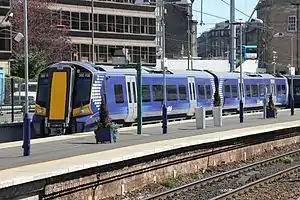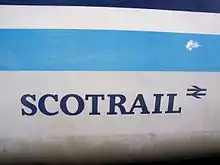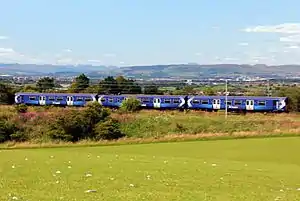ScotRail (brand)
ScotRail (Scottish Gaelic: Rèile na h-Alba) has been the brand name used for all Scottish regional and commuter rail services, including some cross-border services, since September 1983. Since 2008, it is the permanent name of the Scottish franchised rail services, regardless of the train operating company that operates them, which since 2015 is Abellio ScotRail.
| Rèile na h-Alba | |
 | |
 | |
| Main area(s) | Scotland |
|---|---|
| Other area(s) | Northern England |
| Stations called at | 354 operated[1] |
| Other | |
| Website | www.scotrail.co.uk |
History



British Rail
The ScotRail brand was created by British Railways Scottish Region manager Chris Green in the mid 1980s[3] to provide a distinctive brand for the rail network in Scotland. The brand has developed and is still in use today.
ScotRail, under BR, used customised versions of the existing British Rail liveries, with passenger locomotives and coaching stock painted in a lightly modified version of the InterCity Executive livery. The red stripe was replaced with a saltire blue stripe, and the InterCity name was replaced with the ScotRail name. Most diesel locomotives carried standard InterCity Executive livery, but with ScotRail branding. Diesel and electric multiple units carried normal versions of the Regional Railways livery. In the SPT area, rolling stock (DMUs and EMUs) was painted in Strathclyde orange and black.
National Express
The brand was adopted by National Express when it took over the franchise from British Railways during privatisation in 1997.[4] The first unique ScotRail livery was introduced shortly after privatisation under National Express, who introduced their own livery. Initially, vehicles received the new ScotRail logo applied with vinyl stickers; a stylised outline of Scotland composed of three flashes in the corporate colours of green, red and purple. Multiple units were painted into the new livery with bodies in white (lower half) and purple (upper half) with green, red and white stripes bordering the purple, overlain by and a wide diagonal white band in the centre of the carriage. There were no units left with Regional Railways livery in Scotland at the end of the National Express franchise period, although the Class 305 electric units retained it until withdrawal in 2001. The latter were replaced by ex-Stansted Skytrain Class 322 units which were never repainted under the National Express franchise, receiving only ScotRail logo transfers. When the Class 322 hire ended in 2004, they were replaced on the North Berwick branch by English Welsh & Scottish Class 90 electric locomotives hauling former Virgin Trains Mk.3 coaching stock, in the old Virgin red and grey livery, again with ScotRail logo transfers.
FirstGroup
When FirstGroup became the franchisee on 17 October 2004, in line with other rail franchises it held, the brand was revised as First ScotRail, having outbid National Express.[5][6]
When First originally acquired the franchise, a new regional livery of pink, grey and purple and a new logo of a pink circle and an italicised f character was introduced. Legislation requiring train doors to be painted in a contrasting colour to the body, for visually impaired passengers, resulted in white doors with a pink stripe. Like National Express, First applied their logo on units by transfer until repainting. A large number of units were re-branded into this livery, including the Class 322 units re-acquired and refurbished for North Berwick service and the Class 90 locomotives used on Caledonian Sleeper services.
Transport Scotland
In September 2008, the Scottish Government agency, Transport Scotland, announced that the franchised Scottish rail services would be permanently renamed ScotRail.[7][8] Transport Scotland came up with a new livery which will be applied to all of Scotland's trains, when they went into maintenance. The new livery is dark blue background, with grey doors and a white dotted 'Saltire' Scottish flag. A new logo is also applied, ScotRail, with the tagline 'Scotland's Railway', which on some units is replaced with the Scottish Gaelic translation 'Rèile na h-Alba'. Stations and staff uniforms have also been given a new dark blue look. This livery is not going to be replaced when the franchise ends, the only branding showing the operator will be a small "ScotRail is operated by" sign on the station building and on the train doors.[9] The franchise transferred to Abellio ScotRail on 1 April 2015.
Caledonian Sleeper
The Caledonian Sleeper rolling stock was not treated with the Transport Scotland livery as it was transferred to a separate franchise operated by Serco on 1 April 2015.
Abellio
Since 1 April 2015 ScotRail has been operated by Abellio.
References
- "ScotRail: Key Statistics - Table 2.10" (PDF). Office of Rail and Road. 9 July 2019. Retrieved 30 January 2021.
- http://doublearrow.co.uk/regional_railways.htm
- Stewart, Valerie & Chadwick, Vivian (1987). Changing Trains: messages for management from the ScotRail challenge. Newton Abbot: David & Charles. ISBN 0-7153-8870-3.
- "National Express pledges new trains for ScotRail" Rail Magazine issue 300 12 March 1997 page 14
- FirstGroup clinches Scottish rail franchise The Daily Telegraph 12 June 2004
- First Welcomes Award of ScotRail Franchise Archived 6 October 2014 at the Wayback Machine First ScotRail 11 June 2004
- ScotRail 25th Anniversary Publicity Materials Archived 9 October 2008 at the Wayback Machine Transport Scotland
- Dalton, Alastair (23 September 2008). "ScotRail marks birthday with Saltire look". The Scotsman. Retrieved 1 February 2016.
- Rail issue 602